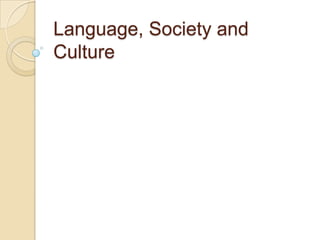Language, society and culture
•Download as PPTX, PDF•
10 likes•11,696 views
Report
Share
Report
Share

Recommended
More Related Content
What's hot
What's hot (20)
Discourse analysis (Linguistics Forms and Functions)

Discourse analysis (Linguistics Forms and Functions)
FIRST LANGUAGE ACQUISITION AND SECOND LANGUAGE ACQUISITION

FIRST LANGUAGE ACQUISITION AND SECOND LANGUAGE ACQUISITION
Viewers also liked
Viewers also liked (20)
Society in language or language in society by amir zeshan

Society in language or language in society by amir zeshan
Similar to Language, society and culture
Similar to Language, society and culture (20)
Applied linguistics session 2_ 12_10_2021 Prescribing & Describing language.pdf

Applied linguistics session 2_ 12_10_2021 Prescribing & Describing language.pdf
More from Jano Avila Moncada
More from Jano Avila Moncada (19)
Recently uploaded
Recently uploaded (20)
ProductAnonymous-April2024-WinProductDiscovery-MelissaKlemke

ProductAnonymous-April2024-WinProductDiscovery-MelissaKlemke
AWS Community Day CPH - Three problems of Terraform

AWS Community Day CPH - Three problems of Terraform
Spring Boot vs Quarkus the ultimate battle - DevoxxUK

Spring Boot vs Quarkus the ultimate battle - DevoxxUK
Apidays New York 2024 - Passkeys: Developing APIs to enable passwordless auth...

Apidays New York 2024 - Passkeys: Developing APIs to enable passwordless auth...
Why Teams call analytics are critical to your entire business

Why Teams call analytics are critical to your entire business
Apidays New York 2024 - The Good, the Bad and the Governed by David O'Neill, ...

Apidays New York 2024 - The Good, the Bad and the Governed by David O'Neill, ...
How to Troubleshoot Apps for the Modern Connected Worker

How to Troubleshoot Apps for the Modern Connected Worker
2024: Domino Containers - The Next Step. News from the Domino Container commu...

2024: Domino Containers - The Next Step. News from the Domino Container commu...
TrustArc Webinar - Unlock the Power of AI-Driven Data Discovery

TrustArc Webinar - Unlock the Power of AI-Driven Data Discovery
Finding Java's Hidden Performance Traps @ DevoxxUK 2024

Finding Java's Hidden Performance Traps @ DevoxxUK 2024
Strategize a Smooth Tenant-to-tenant Migration and Copilot Takeoff

Strategize a Smooth Tenant-to-tenant Migration and Copilot Takeoff
Polkadot JAM Slides - Token2049 - By Dr. Gavin Wood

Polkadot JAM Slides - Token2049 - By Dr. Gavin Wood
Language, society and culture
- 2. The way you speak provide you with some information about your social context or your region. But there are some other variations.
- 3. A speech community is a group of people who share a set of norms, rules and expectations regarding the use of language. Investigating language from this perspective is sociolinguistics.
- 4. Sociolinguistics: Deals with the inter- relationships between language and society.
- 5. Social Dialects: Is the result of the taking into account that we are able to make studies on social dialects.
- 6. Interaction between social values and language we recognized. Over prestige: Positve valued ways of speaking in social communities. Covert prestige: Hidden positive values.
- 7. Social Class and Education There are variation according to social class and also according to education level. It will depend on the level of education the speaker has and their social position.
- 8. Age and Gender Variation according to age is possible to be found among parents and their children, for example. But it is most noticiable across the grandparents – grandchild time span.
- 9. Among male and female speakers there are some other variations. Women and men do not use the language in the same way. For example, women tend to use more formal style.
- 10. Ethnical Backgroung One of the social varieties is according to ethnical background. A clear example of this is the one used by the African-Americans known as Black English Varnicular (BEV)
- 11. Idiolect: Personal dialect of each speaker of a language.
- 12. Style Register According to the style of register used by the speaker it goes from the informal to the very formal. This differences can also be found in written language with business letters versus letters to friends. *Written language will always be more formal than spoken language.
- 13. Jargon: Technical vocabulary associated with a special activity or group.
